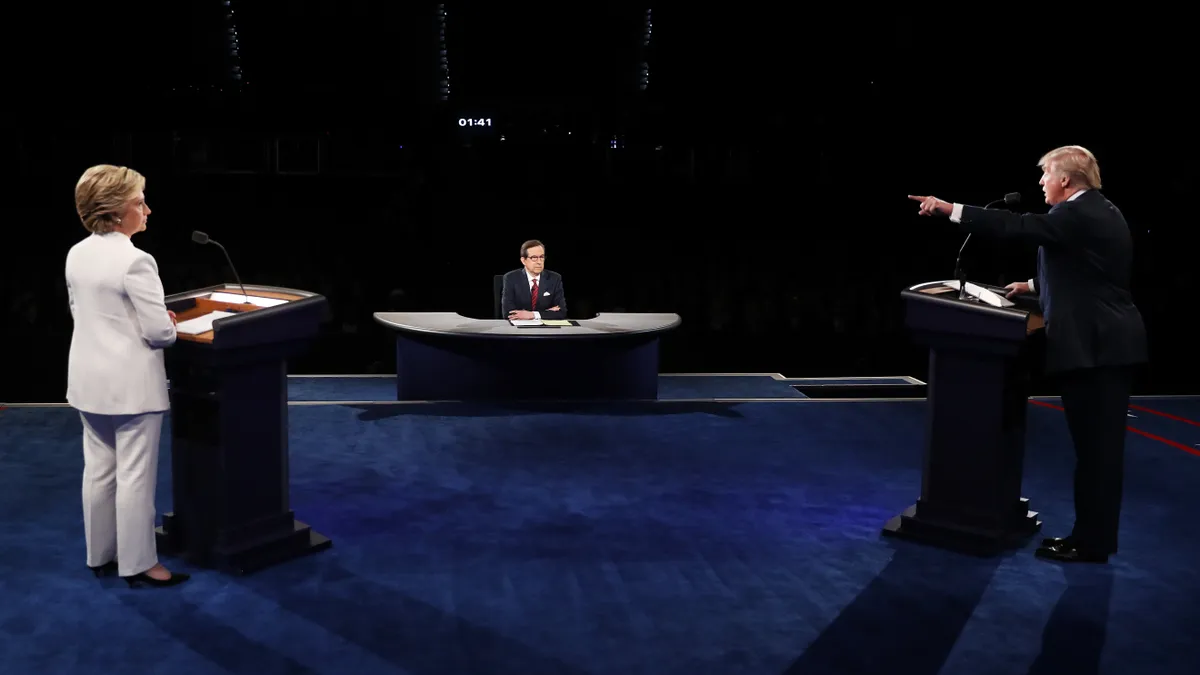Dive Brief:
- The trajectory of U.S. energy and climate policy is at stake at the ballot box today, with starkly different visions for the American power sector on offer in both the presidential election and a number of state races.
- In the presidential race, Democratic nominee Hillary Clinton promises gradual decarbonization and a future based on more renewable resources. Republican Donald Trump espouses support for the fossil fuel industry and a desire to revive the American coal sector. Control of the U.S. Senate also hangs in the balance.
- On the state level, utilities and the solar industry are squaring off in Florida and Arizona, while NV Energy's monopoly is on the chopping block in Nevada and a carbon tax proposal in Washington has split the political left.
Dive Insight:
For America's largest utility companies, the preference in the presidential election is clear.
Hillary Clinton topped the list of campaign funding recipients from the electric utility sector this year with nearly $500,000, according to the Center for Responsive Politics. Donald Trump didn't break the top 20.
In an age where most campaign funding comes through back channels, that total may not mean much to Clinton's campaign efforts, but it does show where the sector thinks its interests lie. With the nation's investor-owned utilities signed on to comply with the Obama administration's Clean Power Plan, it appears their leaders prefer the relative stability of a Clinton administration to the unpredictability of Trump's.
Whichever candidate comes out on top tonight will have the opportunity to shape U.S. energy and climate policy for decades to come. The U.S. power sector has cut carbon emissions in recent years, but the nation remains behind the trajectory for emissions reductions laid out in accordance with the Paris Climate Accord.
Because utility assets last for decades, the decisions they make in the next decade will help determine if the sector can decarbonize without being forced to retire fossil fuel infrastructure early. Electing Donald Trump, who has said he would end the Clean Power Plan and pull the U.S. out of the Paris accord, could signal to the sector that those policy goals will never be implemented and encourage more fossil fuel investment.
Conversely, Hillary Clinton has indicated support for strengthening U.S. climate goals and supporting renewable energy. Her election could see the executive branch push for more stringent carbon regulations for the power sector and other industries. It would also bode well for the Clean Power Plan, which faces a likely hearing next year at the Supreme Court.
But even if they have sought to curry favor with the Clinton camp, utilities have actively sought to give her a Democratic majority in the Senate. Most large companies gave to Congressional candidates from both parties, and the Edison Electric Institute even contributed to both party campaign committees.
For some utilities, the more immediate policy action will come from state races.
In Florida, utilities are backing Amendment 1, which they say will protect a consumer's right to go solar. But the solar industry says the proposal is intentionally confusing and would ensure third-party ownership of rooftop systems remains illegal. The state Supreme Court refused to remove the amendment from the ballot earlier this week. It needs 60% of the vote to pass.
In Arizona, utilities and the solar sector have poured more than $6 million into the race for the Arizona Corporation Commission. That state is home to high-profile debates over the valuation of distributed solar, and whoever is elected to the commission could help set national precedents for rooftop solar policy in the coming years.
Nevada could end the retail monopoly enjoyed by utility NV Energy today if voters approve a ballot proposal there supported by major casinos. Some large consumers have sought to leave the incumbent utility's service and attempt to procure lower-cost power on the open market.
And in Washington, residents will vote on a proposal that could institute the world's highest carbon tax, but has failed to win support of some progressive groups because it is revenue neutral.
Utility Dive will have updates on each race Wednesday morning.














